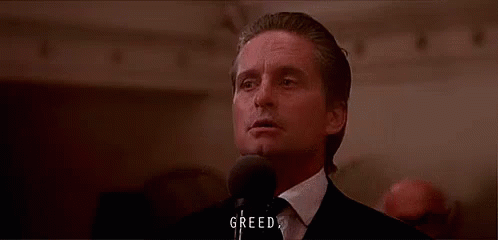Unexpected Risks To Your Retirement Plan
What comes to mind when you imagine something wiping out your retirement savings? A personal...

While inflation has been cooling off from the craziness we saw in 2021 and 2022, it is still well above the Fed's targeted range of 2-3%.
So, with ::gestures at everything going on in the world right now:: why has inflation been so stubborn to come down?
Reports are starting to come around to an idea that it could be corporate greed - a thought that was initially scoffed at when the concept of "greedflation" was first introduced.
But in March, the chief economist at UBS Global Wealth Management, Paul Donovan, published a note on "profit margin-led inflation," describing how in late 2022 and into this year, companies — particularly retailers and consumer goods makers — convinced consumers that they needed to raise prices.
Businesses both large and small have a convincing story to tell: They really don't want to raise prices, but there was "this terrible war or the pandemic or labor shortages or whatever," chief economist at UBS Global Wealth Management, Paul Donovan told Axios. "That's what's basically been going on."
Normally, when a business raises its prices too high, it would lose customers to competitors that don’t, or not by as much.
But, like the Wall Street Journal notes in an article from May 2nd, these aren't normal times:
"In rare situations—such as an economy’s reopening after a pandemic—widespread knowledge that costs are rising allows businesses to raise their prices knowing that their competitors will act in the same way, according to a paper by Isabella Weber, assistant professor of economics at the University of Massachusetts, Amherst, and her colleague, Evan Wasner.
That is a pattern the two economists said has played out in an analysis of recent earning calls in which executives at U.S. businesses present their financial results to analysts.
"We do have to think about pricing differently,' said Ms. Weber. 'A cost shock, or bottlenecks can create an implicit agreement among firms that raise their prices, so they can expect others to act likewise.' "
Consumers have also been unusually willing to accept higher prices lately. Paul Donovan (reminder, he's the chief economist at UBS Global Wealth Management) said businesses are betting that consumers will go along because they know about supply bottlenecks and higher energy prices.
As Axios reminds us:
When inflation kicked up in 2021, economists were on watch for the kind of wage-price spiral the U.S. saw back in the 1970s. That is, as prices for goods increased, workers would demand and receive higher pay, which would in turn drive prices even higher.
But the spiral never quite materialized, leading many to search for other answers.
Data and research from Weber and other places helped bolster the case for inflation's connection to corporate profits. Even Fed chair Jerome Powell said earlier this month that wages are not the principal driver of inflation — an apparent pivot from his views in late 2021.
The Wall Street Journal Notes:
"Last month, Procter & Gamble said it had boosted its profit margins in the first three months of the year, thanks in large part to higher prices. It warned that there were limits to how far it could push that tactic before consumers switched to cheaper alternatives."
Paul Donovan at UBS believes the period of profit-driven inflation might be coming to an end, in part because of rising public scrutiny.
“We are probably at a point where companies may be reassessing whether to push this,” he said. “A reputation for being poor value for money stays for a long time.”
We may already be there - according to an article in Reuters (written yesterday, May 24th) Kraft Heinz paused price rises in February, saying consumers are “paying more attention to the price tag”.
Well, that depends...
Lower prices and cost-of-living expenses are generally great if you already on a fixed cost of living and have no debt, but if you are within 5-10 years of retirement, there are a few things you should consider (courtesy of Tim Davis):
That's the true cost of market uncertainty - sleepless nights, stress, and a sense of helplessness, jeopardizing the retirement you've worked so hard to achieve.
What good is retirement if you spend it worried about whether or not you can enjoy it? Set up time to speak with us about your retirement situation, and see if your situation matches our expertise.
What comes to mind when you imagine something wiping out your retirement savings? A personal...
Your retirement is known as “the golden years” for a reason.
Traveling, relaxing, spending more...
The days are getting shorter, the air a bit more “crisp”, and we’re quickly approaching the...